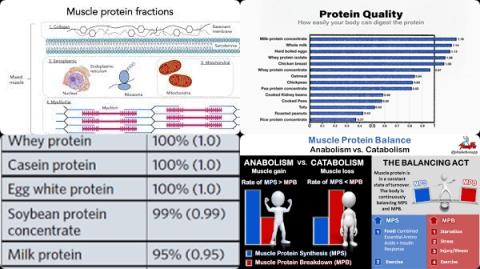
Objectives:
There is much debate regarding the source/quality of dietary proteins in supporting indices of skeletal muscle anabolism. Therefore, this review article has been conducted.
What is the effect of protein source/quality on acute muscle protein synthesis (MPS) and changes in lean body mass (LBM) and strength, when combined with resistance exercise (RE)?
Study design:
This review article included 27 studies that compared the effects of ≥2 dose-matched, predominantly isolated protein sources of varying "quality”, in young (18-35 y) and older (≥60 y) adults.
3 separate models were employed as follows: 1) protein feeding alone on muscle protein synthesis, 2) protein feeding combined with a bout of resistance exercise on muscle protein synthesis and 3) protein feeding combined with longer-term resistance exercise training (RET) on lean body mass and strength.
The mean age for the young groups across all 3 models ranged between 20 and 29 y and the older groups were between 61 and 75 y.
Results and conclusions:
The investigators found analysis revealed an effect favoring higher-quality protein for postprandial muscle protein synthesis at rest [mean difference (MD) = 0.014%/h, 95% CI = 0.006 to 0.021, p 0.001] and following resistance exercise [MD = 0.022%/h, 95% CI = 0.014 to 0.030, p 0.00001] in young [model 1 = 0.016%/h, 95% CI = -0.004 to 0.036, p = 0.12. Model 2 = 0.030%/h, 95% CI = 0.015 to 0.045, p 0.0001] and older [model 1 = 0.012%/h, 95% CI = 0.006 to 0.018, p 0.001. Model 2 = 0.014%/h, 95% CI = 0.007 to 0.021, p 0.001] adults.
The investigators found, however, although higher protein quality was significantly associated with superior strength gains with resistance exercise training [standardized mean difference (SMD) = 0.24 kg, 95% CI = 0.02 to 0.45, p = 0.03], no effect was observed on changes to lean body mass [SMD = 0.05 kg, 95% CI = -0.16 to 0.25, p = 0.65].
The investigators concluded that protein quality provides a small but significant impact on indices of muscle protein anabolism in young and older adults. However, further research is warranted to elucidate the importance of protein source/quality on musculoskeletal aging, particularly in situations of low protein intake.
Original title:
Protein Source and Quality for Skeletal Muscle Anabolism in Young and Older Adults: A Systematic Review and Meta-Analysis by Morgan PT, Harris DO, […], Breen L.
Link:
https://www.ncbi.nlm.nih.gov/pmc/articles/PMC8245874/
Additional information of El Mondo:
Find more information/studies on protein and sport nutrition right here.